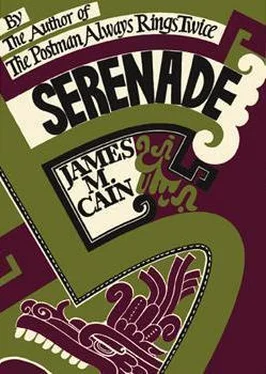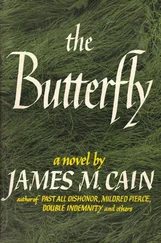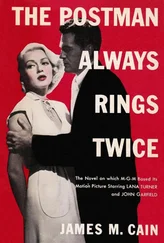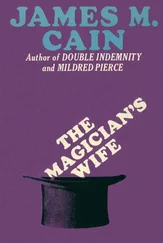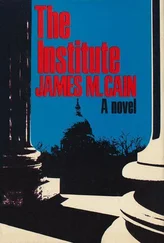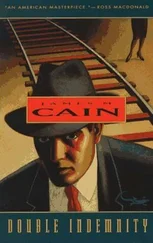So in a couple of days we moved in. I found a Japanese couple that didn’t speak any English, Italian, or Spanish, and we had to wigwag, but there was no chance of their finding out too much. I was practicing Spanish morning, noon and night, so she and I would be able to talk in front of other people without using English, and I tried to speak it with an Italian accent, but I still wasn’t sure I was getting away with it. With the Japs, though, it was safe around the house.
So then we breathed a little easier, and began to shake down into a routine. Daytime we’d lay around, mostly upstairs, in our bedroom. At night we’d walk down to the park and listen to the band. But we’d always sit well away from it, on a lonely bench. Then we’d come back, flit the mosquitoes, and go to bed. There was nothing else to do, even if we had thought it was safe to do it. Guatemala is the Japan of Central America. They’ve copied everything. They’ve got Mexican music, American movies, Scotch whisky, German delicatessens, Roman religion, and everything else imported you can think of. But they forgot to put anything of their own in, and what comes out is a place you could hardly tell from Glendale, California, on a bet. It’s clean, modern, prosperous, and dull. And the weather gives you plenty of chance to find out how dull it really is. We hit there in June, at the height of the rainy season. It’s not supposed to rain in Central America, by the books, but that’s wrong. It rains plenty, a cold, gray rain that sometimes keeps up for two days at a time. Then when the sun comes out it’s so sticky hot you can hardly breathe, and the mosquitoes start up. The air gets you down almost as bad as it does in Mexico. Guatemala City is nearly a mile up in the air, and at night that feeling of suffocation comes over you, so you think you’ll die if you don’t get something in your lungs you can breathe.
Little by little, a change came over her. Mind you, from the time we left New York we hadn’t said one word about Winston, or what she did, or whether it was right or wrong, or anything about it. That was done, and we steered around it. We talked about the Japs, the mosquitoes, where Conners was by now, things like that, and so long as we jumped at every noise, we seemed to be nearer than we ever had been. But after that eased off, and we began to kid ourselves we were safe, she began moping to herself, and now and then I’d catch her looking at me. Then I noticed that another thing we never talked about was my singing. And then one night, just as we started downstairs to go out in the park, just mechanically I did a little turn, and in another second would have cut loose a high one. I saw this look of horror on her face, and choked it off. She listened, to see if the Japs had caught it. They seemed to be in the kitchen, so we went down. Then it came to me, the spot I was in. On the way down I hadn’t even thought about singing. But here, and any other place south of the Rio Grande, for that matter, my voice was just as familiar as bananas. My picture, in the lumberjack suit, was still plastered all over the Panamier show windows, Pablo Buñan had played the town not a month before, even the kids were whistling My Pal Babe. Unless I was going to send her to the chair, I couldn’t ever sing again.
I tried not to think about it, and so long as I could read, or do something to get my mind off it, I wouldn’t. But you can’t read all the time, and in the afternoon I’d get to wishing she’d wake up from her siesta, so we could talk, or practice Spanish, and I could shake it off. Then I began to get this ache across the bridge of my nose. You see, it wasn’t that I was thinking about the fine music I couldn’t sing any more, or the muted song that was lost to the world, or anything like that. It was simpler than that, and worse. A voice is a physical thing, and if you’ve got one, it’s like any other physical thing. It’s in you, and it’s got to come out. The only thing I can compare it with is when you haven’t been with a woman for a long time, and you get so you think if you don’t find one soon, you’ll go insane. The bridge of the nose is where your voice focuses, where you get that little pull when you cut loose, and that was where I began to feel it. I’d talk, and read, and eat, and try to forget it, and it would go away, but then it would come back.
Then I began to have these dreams. I’d be up there, and they’d be playing my cue, and it would be time for me to come in, and I’d open my mouth, and nothing would come out of it. I’d be dying to sing, and couldn’t. A murmur would go over the house, he’d rap the orchestra to attention, look at me, and start the cue again. Then I’d wake up. Then one night, just after she had gone over to her bed, something happened so we did talk about it. In Central America, they’ve got radios all over the place, and there were three in the block back of us, and one of them had been setting me nuts all day. It was getting London, and they don’t have any of that advertising hooey over there. The whole Barber of Seville had come over in the afternoon, with only a couple of small cuts, and at night they had played the Third, Fifth, and Seventh Beethoven symphonies. Then, around ten o’clock, a guy began to sing the serenade from Don Giovanni, the same thing I had sung for Conners at Acapulco, the same thing I had sung the night I came in big at the Metropolitan. He was pretty good. Then, at the end, he did the same messa di voce that I had done. I kind of laughed, in the dark. “... Well, he’s heard me sing it.”
She didn’t say anything, and then I felt she was crying. I went over there. “What’s the matter?”
“Hoaney, Hoaney, you leave me now. You go. We say goodbye.”
“Well — what’s the big idea?”
“You no know who that was? Who sing? Just now?”
“No. Why?”
“That was you.”
She turned away from me then, and began to shake from her sobs, and I knew I had been listening to one of my own phonograph records, put on the air after the main program was over. “... Well? What of it?”
But I must have sounded a little sick. She got up, snapped on the light, and began walking around the room. She was stark naked, the way she generally slept on hot nights, but she was no sculptor’s model now. She looked like an old woman, with her shoulders slumped down, her feet sliding along in a flat-footed Indian walk, her eyes set dead ahead, like two marbles, and her hair hanging straight over her face. When the sobs died off a little, she pulled out a bureau drawer, got out a gray rebozo , and pulled that over her shoulders. Then she started shuffling around again. If she had had a donkey beside her, it would have been any hag, from Mexicali to Tapachula. Then she began to talk “... So. Now you go? Now we say adiós ”.
“What the hell are you talking about? You think I’m going to walk out on you now?”
“I kill these man, yes. For what he do to you, for what he do to me, I have to kill him. I know these thing at once, that night, when I hear of the inmigración , that I have to kill him. I ask you? No. Then what I do? Yes? What I do!”
“Listen, for Christ’s sake—”
“What I do? You tell me, what I do?”
“Goddam if I know. Laughed at him, for one thing.”
“I say goodbye. Yes, I come to you, say remember Juana, kiss you one time, adiós . Yes, I kill him, but then is goodbye. I know. I say so. You remember?”
“I don’t know. Will you cut it out, and—”
“Then you come to boat. I am weak. I love you much. But what I do then? What I say?”
“Goodbye, I suppose. Is that all you know to say?”
“Yes. Once more I say goodbye. The capitán , he know too, he tell you go. You no go. You come. Once more, I love you much, I am glad... Now, once more. Three times, I tell you go. It is the end. I tell you, goodbye.”
Читать дальше
